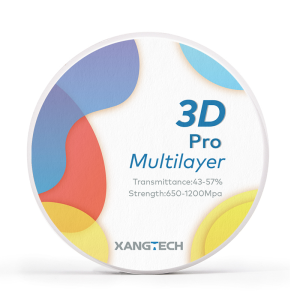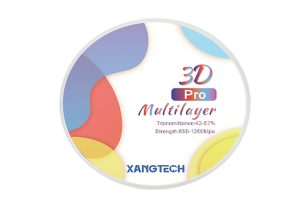Veneers are dental materials that are custom-made to cover the surface of the teeth after the dentist examined the patient. Because they can be customised to the patient’s tooth structure, our zirconia blocks provide a more natural and symmetrical tooth alignment. In addition, the veneering process causes minimal damage to the natural teeth and is comparatively less painful for the patient. At the same time, dental veneers can repair slight tooth misalignments, reduce the number of orthodontic treatments a patient has to undergo and reshape irregularly shaped teeth.

As dental technology continues to evolve, so do the number of dental materials suitable for dental veneers. To summarize, different materials have their advantages. Dental zirconia blocks, for example, are known for their strength and natural translucency, and porcelain veneers are very durable and resistant to staining, them popular with dentists and patients alike. This material is more affordable than porcelain veneers. Veneer formers made from PMMA blocks, on the other hand, can be applied directly to the teeth and then sculpted to achieve the desired shape and color. While composite resin veneers are not as stain-resistant as porcelain veneers, they are easy to repair if damaged. Lithium disilicate has excellent light transmission and color matching capabilities, making it one of the most aesthetically pleasing veneers available. It is not as strong as zirconia blocks, but lithium disilicate has sufficient strength for most anterior applications. Due to its natural appearance, it is ideal for creating realistic restorations, especially for anterior veneers where aesthetics are critical. In addition, titanium is extremely strong and biocompatible and also has excellent mechanical properties, but because of its metallic color and opacity, it is suitable for dental implants and is generally not used for aesthetic veneers.
Veneers are custom-made to match the color and shape of the natural teeth and blend in perfectly with the surrounding teeth. This allows clients to achieve an aesthetically pleasing and natural looking smile. On top of that, they effectively cover discoloration and stains that traditional whitening treatments cannot address, giving a brighter, more even color to the teeth. In addition to this, dental veneers are designed to correct flaws in the shape or size of the teeth, resulting in a more harmonious overall appearance. Compared to other restorative methods such as dental crowns, veneers usually require minimal alterations to the natural tooth structure and can preserve more of the tooth’s structure. From a maintenance cost perspective, veneers are particularly resistant to food and drink stains and are easy to clean, keeping them bright for a long time without a lot of maintenance. Modern veneer materials, which are highly biocompatible, are very safe, so they are unlikely to cause allergic reactions or have an adverse effect on the mouth.

The dental veneers market is expected to witness significant growth in the future with the increasing demand for cosmetic dental procedures. Continuous research on new materials by researchers may lead to the development of better performing dental veneers in the future. Moreover, with sustainability being the need of the hour, there is a growing demand for eco-friendly dental materials. Future veneers may be made of biodegradable or recyclable materials to appeal to environmentally conscious consumers. The emergence of these emerging materials is likely to accelerate the expansion of the market for the dental veneers industry. It is evident that dental professionals will increasingly focus on providing tailor-made solutions for dental veneers as consumer expectations for personalized care grow. This includes customizing shades, shapes, and sizes to meet individual aesthetic goals and preferences. This will also lead to the segmentation of the dental veneers market and the emergence of more markets focused on finely customized dental veneers in the future. Driven by technological advancements, changing consumer needs, and a focus on personalized care, the future of the dental veneers market will be one of vibrant growth and innovation. As dental professionals adapt to these trends, the dental veneers market is likely to see a wider range of treatment options, more advanced materials, and more convenient access, ultimately changing the landscape of cosmetic dentistry.












